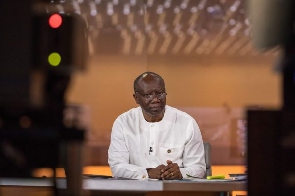 Finance Minister, Ken Ofori-Atta
Finance Minister, Ken Ofori-Atta
Government’s worst fears regarding the impact of the COVID-19 pandemic on its fiscal performance are fast becoming a reality, with the revenue shortfall for the first quarter of this year alone amounting to GH¢3.6bn.
The Bank of Ghana’s recently published Fiscal Developments Report stated that government recorded GH¢10.4bn in revenue and grants as against a target of GH¢13.9bn for the period.
Although revenue suffered multiple setbacks, its biggest decline came from tax revenue, which fell short of its mark by more than GH¢1.7bn, illustrating the pain the virus has caused the real sector.
The report stated that tax revenue – comprising taxes on income and property, taxes on domestic goods and services, and international trade taxes – amounted to GH¢8.4bn (2.2 percent of GDP), lower than the target of GH¢10.2bn (2.6 percent of GDP).
The tax revenue performance for the first three months of this year represents a year-on-year growth of 0.5 percent, which contrasts with the 18.9 percent growth recorded in the same period of 2019.
Although government projected to receive more than GH¢1.9bn from oil revenue within the period, the collapse in crude oil prices triggered by the pandemic had government receiving a little over GH¢300m.
Rising expenditure
The report noted that government’ spending surged in the first quarter, in part due to unbudgeted expenditure to contain the COVID-19 pandemic, compensation to employees, and capital expenditures.
During the first three months of the year, the government spent GH¢20.8bn, representing year-on-year growth of 33 percent.
As far as compensation of employees is concerned, GH¢6.5bn was spent as against the planned GH¢5.9bn. To put that in perspective, it means that government spent nearly 65 percent of domestic revenue as at end-March 2020 to compensate its workers.
Other key expenditure items were interest payment, which took as much as GH¢6.4bn, although the amount spent was generally within what government had programmed.
However, expenditure incurred on infrastructure development for the period went up to GH¢2.5bn, although government had wanted to spend GH¢2.2bn.
With government incurring a fiscal deficit of 3.4 percent of GDP as against a target of 1.9 percent, the central bank fears that there is a real risk for the country’s debt.
“Elevated government spending in response to the pandemic exacerbated the substantial drop in domestic revenue resulting from the pandemic and falling oil prices. Going forward, fiscal policy will largely depend on how these two reinforcing factors evolve. The expanding deficit and the primary deficit would exert pressure on the public debt stock, and alongside lower growth projections for 2020, may pose debt sustainability risks over the medium-term,” the bank said in its report.
GDP out today
The Ghana Statistical Service is today expected to release the GDP performance for the first quarter of this year. This data will provide additional insight regarding the scale of the impact the coronavirus has had on the economy.
Ghana’s response to the pandemic, like in the rest of the world, has seen widespread disruption to routine economic activities, with the Finance Ministry predicting that growth will fall to its lowest in nearly four decades.
Although the disruption caused by the virus has impacted almost every facet of the economy, the services sector has been the most hit.
Since March, the country has shut down its borders, sending the tourism sector, heavily dependent on foreign travelers, into a complete meltdown. The Trades Union Congress (TUC) says the thousands of jobs lost in the sector may not be recovered.
- Commonwealth countries must create 5,000 jobs everyday till 2030 - Foreign Affairs Minister
- Use COVID-19 fund to strengthen health care, immunization financing — HFFG
- Parliament records a new case of coronavirus
- Breach of coronavirus safety protocols: GMA calls for action
- Chadians line up for Sinopharm as coronavirus vaccination campaign begins
- Read all related articles












